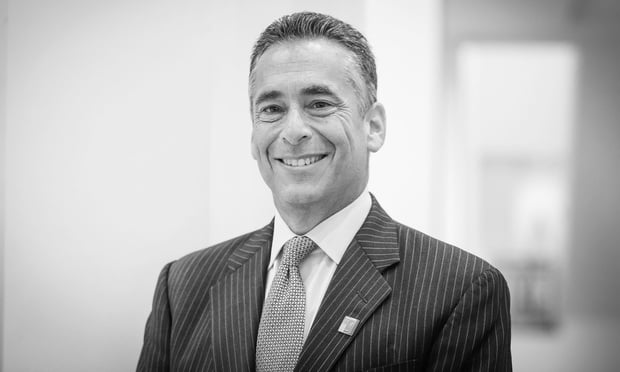Don't Forget About Diversity and Inclusion During COVID-19: A Q&A With NAMWOLF CEO Joel Stern
"When crises hit, diversity and inclusion take a back seat if it is not embedded in the DNA of the corporations or the law firms. It is an easy thing to not focus on when you have 50 other priorities," Joel Stern, CEO of the National Association of Minority & Women Owned Law Firms, said.
April 15, 2020 at 06:29 PM
7 minute read
 Joel Stern, CEO of the National Association of Minority & Women Owned Law Firms. Courtesy photo
Joel Stern, CEO of the National Association of Minority & Women Owned Law Firms. Courtesy photo
Diversity and inclusion initiatives can easily lose traction because of a crisis. Recalling the years before the Great Recession, Joel Stern, the CEO of Chicago-based National Association of Minority & Women Owned Law Firms, said legal departments were beginning to survey their law firms on diversity and inclusion efforts.
During that time he served as an in-house attorney at Accenture, which began a diversity and inclusion program, and noted companies such as DuPont were also putting diversity and inclusion initiatives in place.
"There was some progress made and companies were excited about it," Stern said. "When the crisis hit, we lost that momentum."
In fact, progress went the opposite way. For example, in 2009, African American attorneys represented 4.66% of associates in 2009. It was not until 2019 that number grew to 4.76%.
"I do not remember when the Great Recession occurred anybody talking about diversity and inclusion and the need to keep this a focus of attention," Stern said.
It is too soon to tell if the new coronavirus is impacting diversity and inclusion efforts, Stern said. However, in the midst of the pandemic and getting people set up to work from home, along with other issues that arise, it is easy to put those efforts in the back seat. He explained that if corporations and their legal departments neglect their diversity and inclusion efforts during the pandemic, they will lose any traction they have gained.
This conversation has been edited for length and clarity.
Corporate Counsel: Are you finding that diversity and inclusion efforts are being impacted by COVID-19?
Joel Stern: I think it is too early to tell. I can give you some rays of optimism. We measure solicitations where corporations reach out to us and they can say that, for example, they're looking for an employment lawyer. They ask us to reach out to the NAMWOLF firms to see if they can do it. Just from that metric, I can tell you that we're way ahead of where we were last year.
What we're trying to get corporations to understand is that now it is even more important than it was six months ago to make [it] the center of attention.
CC: Why are diversity and inclusion efforts more important now than they were six months ago?
JS: When crises hit, diversity and inclusion take a back seat if it is not embedded in the DNA of the corporations or the law firms. It is an easy thing to not focus on when you have 50 other priorities. You don't want the hard work of many to be erased by this pandemic. We do not want to see smaller law firms, which are disproportionately minority- and women-owned, go by the wayside. We don't want to see law firms get rid of the programs that benefited minorities and women.
When this pandemic hit, if those general counsel decided not to focus on diversity and inclusion, the message they're sending to big law is that they don't care about it. As a result, diversity and inclusion become philanthropy rather than a core part of their business and that is our fear.
CC: Are you finding that legal departments are still reaching out to work with different minority- and women-owned law firms or are they sticking with their panel during this time?
JS: The corporations that are active with NAMWOLF are continuing to utilize us to find firms. That is one small aspect of diversity and inclusion.
I always tell people that when you're looking at diversity and inclusion you have to look at it through four lenses: internal, Big Law, supplier diversity and pipeline. My major message to anyone in this profession is to keep their eyes on all of these lenses. They should be doing the same as they were three months ago or do even more if you want this to succeed.
CC: What more can in-house counsel be doing during the pandemic to promote diversity and inclusion?
JS: Diversity and inclusion should still be discussed. That is a critical element. You are discussing it at the leadership level. No. 2 is that if you have an existing program, you continue with it. If you have a program where you tell your law firms that you want 50% of work to be done by women and minorities and you don't tell them that over the next three to four months, what are they going to do? They're not going to give you what you asked for and you're going to take steps back. You should continue to force compliance with whatever programs you have.
For corporations that don't have D&I programs, this is such a great time to develop programs. A simple metric could be to drive more business to minority- and women-owned law firms. Let's figure out where we are today and let's make a goal of where we want to be in the next year.
If you keep it front and center now, you will see the benefits a year from now when we do look at the numbers.
CC: What are some things that smaller minority- and women-owned law firms can be doing now to get work from corporations during the pandemic?
JS: I always tell people that if you use a big firm, there are pockets of excellence, there are pockets of mediocrity, and there is everything in between. One of the advantages that smaller firms have is that they're boutique firms and you can't suffer fools in boutique firms. If there is a firm of 15 people, you know what every lawyer in that firm can do. The quality of the lawyers in these firms is excellent.
You best sell diversity and inclusion if you sell quality first, great value and then the fact that you're a woman- or minority-owned firm. These firms need to sell themselves to buyers of legal services for quality. They can do the legal work and exceed your expectations. Secondly, they bring great value. Value does not necessarily mean cheaper. They shouldn't by definition have to have cheaper rates.
Third is the fact that they are minority- or women-owned. Most of the corporations have supplier diversity initiatives. None of these corporations that have these initiatives in place exempt the legal department.
They should be selling the fact they know how to operate virtually. They're nimble; they're flexible and they're ready and willing to perform.
In-house counsel are looking for how they can be helped in dealing with today's crisis and want to know what tomorrow's crisis will be. For some of the smaller NAMWOLF firms, restructuring and bankruptcy are going to be those issues. There will be tons of employment issues. The more that our firms can anticipate what those issues are the more work they will get.
This content has been archived. It is available through our partners, LexisNexis® and Bloomberg Law.
To view this content, please continue to their sites.
Not a Lexis Subscriber?
Subscribe Now
Not a Bloomberg Law Subscriber?
Subscribe Now
NOT FOR REPRINT
© 2025 ALM Global, LLC, All Rights Reserved. Request academic re-use from www.copyright.com. All other uses, submit a request to [email protected]. For more information visit Asset & Logo Licensing.
You Might Like
View All
FTC Sues PepsiCo for Alleged Price Break to Big-Box Retailer, Incurs Holyoak's Wrath
5 minute read
Wells Fargo and Bank of America Agree to Pay Combined $60 Million to Settle SEC Probe

‘Extremely Disturbing’: AI Firms Face Class Action by ‘Taskers’ Exposed to Traumatic Content
5 minute read
MLB's Texas Rangers Search for a New GC and a Broadcasting Deal
Trending Stories
- 1SDNY Criminal Division Deputy Chief Returns to Debevoise
- 2Brownstein Adds Former Interior Secretary, Offering 'Strategic Counsel' During New Trump Term
- 3Tragedy on I-95: Florida Lawsuit Against Horizon Freight System Could Set New Precedent in Crash Cases
- 4Weil, Loading Up on More Regulatory Talent, Adds SEC Asset Management Co-Chief
- 5Big Banks Did Great Last Year. What Does That Mean for Big Law?
Who Got The Work
J. Brugh Lower of Gibbons has entered an appearance for industrial equipment supplier Devco Corporation in a pending trademark infringement lawsuit. The suit, accusing the defendant of selling knock-off Graco products, was filed Dec. 18 in New Jersey District Court by Rivkin Radler on behalf of Graco Inc. and Graco Minnesota. The case, assigned to U.S. District Judge Zahid N. Quraishi, is 3:24-cv-11294, Graco Inc. et al v. Devco Corporation.
Who Got The Work
Rebecca Maller-Stein and Kent A. Yalowitz of Arnold & Porter Kaye Scholer have entered their appearances for Hanaco Venture Capital and its executives, Lior Prosor and David Frankel, in a pending securities lawsuit. The action, filed on Dec. 24 in New York Southern District Court by Zell, Aron & Co. on behalf of Goldeneye Advisors, accuses the defendants of negligently and fraudulently managing the plaintiff's $1 million investment. The case, assigned to U.S. District Judge Vernon S. Broderick, is 1:24-cv-09918, Goldeneye Advisors, LLC v. Hanaco Venture Capital, Ltd. et al.
Who Got The Work
Attorneys from A&O Shearman has stepped in as defense counsel for Toronto-Dominion Bank and other defendants in a pending securities class action. The suit, filed Dec. 11 in New York Southern District Court by Bleichmar Fonti & Auld, accuses the defendants of concealing the bank's 'pervasive' deficiencies in regards to its compliance with the Bank Secrecy Act and the quality of its anti-money laundering controls. The case, assigned to U.S. District Judge Arun Subramanian, is 1:24-cv-09445, Gonzalez v. The Toronto-Dominion Bank et al.
Who Got The Work
Crown Castle International, a Pennsylvania company providing shared communications infrastructure, has turned to Luke D. Wolf of Gordon Rees Scully Mansukhani to fend off a pending breach-of-contract lawsuit. The court action, filed Nov. 25 in Michigan Eastern District Court by Hooper Hathaway PC on behalf of The Town Residences LLC, accuses Crown Castle of failing to transfer approximately $30,000 in utility payments from T-Mobile in breach of a roof-top lease and assignment agreement. The case, assigned to U.S. District Judge Susan K. Declercq, is 2:24-cv-13131, The Town Residences LLC v. T-Mobile US, Inc. et al.
Who Got The Work
Wilfred P. Coronato and Daniel M. Schwartz of McCarter & English have stepped in as defense counsel to Electrolux Home Products Inc. in a pending product liability lawsuit. The court action, filed Nov. 26 in New York Eastern District Court by Poulos Lopiccolo PC and Nagel Rice LLP on behalf of David Stern, alleges that the defendant's refrigerators’ drawers and shelving repeatedly break and fall apart within months after purchase. The case, assigned to U.S. District Judge Joan M. Azrack, is 2:24-cv-08204, Stern v. Electrolux Home Products, Inc.
Featured Firms
Law Offices of Gary Martin Hays & Associates, P.C.
(470) 294-1674
Law Offices of Mark E. Salomone
(857) 444-6468
Smith & Hassler
(713) 739-1250






